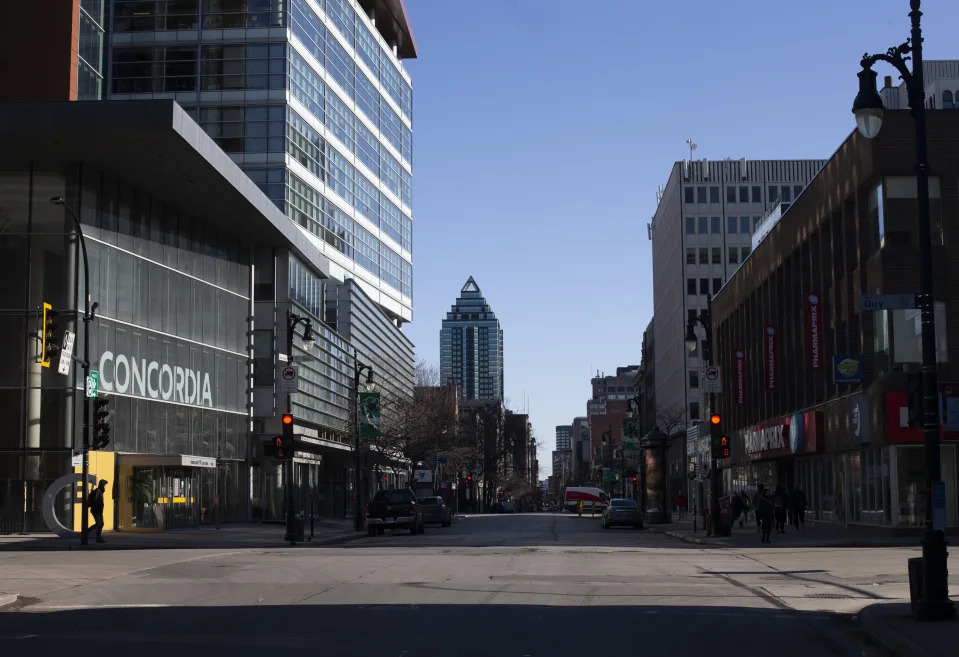How a pro-Palestinian campus group became a national lightning rod
The national wing of Students for Justice in Palestine has drawn fierce criticism for appearing to endorse the Oct. 7 terror attack in Israel. But some students and their legal advocates argue that a wave of crackdowns on SJP chapters is misguided.
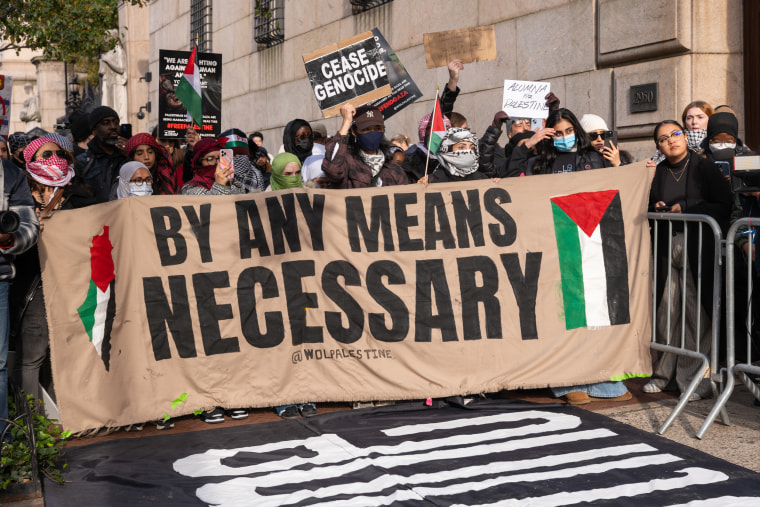
Nov. 24, 2023,
By Daniel Arkin
NBC
Sophie Levitt, a Jewish student at Arizona State University in Tempe, joined the campus chapter of Students for Justice for Palestine when she was a freshman, eager to broaden her worldview after what she describes as a sheltered upbringing in suburban Illinois.
“I learned more about Palestine and how the movement for Palestinian freedom goes along with my own values,” said Levitt, 21, who is now a junior majoring in justice studies and one of the chapter’s key organizers.
In recent weeks, Levitt watched as people across the country — advocacy groups and politicians and fellow student activists — excoriated Students for Justice in Palestine (SJP), a network of campus groups that are affiliated with a national wing but operate autonomously. In a court filing, the American Civil Liberties Union described the national wing as a “coalition and networking group for SJPs and other like-minded groups on college campuses across the nation.”
The criticism has been vehement. Florida Gov. Ron DeSantis accused SJP activists of being in league with Hamas, and a state official ordered the “deactivation” of chapters at two state schools. Two leading Jewish advocacy organizations lambasted SJP’s national steering committee for appearing to commend the Oct. 7 terror attacks. At least three colleges have restricted their local chapters’ activities.
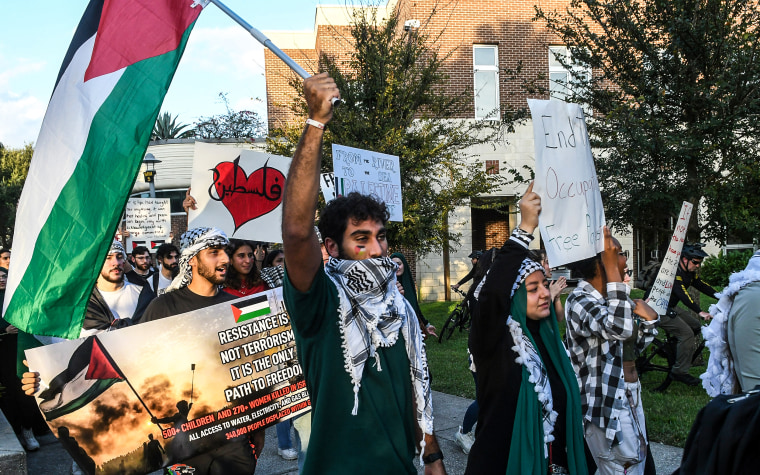
The backlash to those moves has also been intense. Free speech advocates and civil liberties organizations argue that the crackdowns on SJP chapters in Florida amount to unconstitutional infringements on the First Amendment. Meanwhile, some rank-and-file SJP members say their activism has been wrongly punished and incorrectly conflated with the national committee’s rhetoric.
“We don’t meet with them, we don’t really communicate with them, we don’t get funds from them,” said Malak Abuhashim, 21, a senior at Cornell University who has family in Gaza and is active in the campus SJP. “It’s not really that close of a relationship.”
“It’s really concerning to see things like this happening,” Abuhashim added, referring to the recent restrictions. “We are simply asking for the liberation of all people in the land of Palestine.”
The national committee did not respond to an email from NBC News with a list of questions. The committee’s members are anonymous, and the coalition’s website directs members of the news media to a generic form for questions.
Heated rhetoric
In the days after the Oct. 7 terror attack, the national wing of SJP came under fierce scrutiny for a five-page “toolkit” document distributed to campus chapters. The document referred to the deadly assault as a “historic win for the Palestinian resistance.” The “toolkit” also suggested talking points for SJP chapters, such as: “We as Palestinian students in exile are PART of this movement, not in solidarity with this movement.”
The Anti-Defamation League, one of the most prominent Jewish advocacy groups in the U.S., lambasted SJP for having “explicitly endorsed the actions of Hamas.” The ADL and another Jewish rights group, the Brandeis Center, later called on nearly 200 college presidents to investigate their chapters.
DeSantis ordered Florida education officials to “deactivate” SJP chapters at the University of Florida and the University of South Florida, arguing that the “toolkit” constituted material support for a foreign terrorist organization — a felony. Brandeis University, which is not affiliated with the Brandeis Center, banned its chapter because, in its view, the national SJP “openly supports Hamas, a terrorist organization.”
Columbia University and George Washington University, meanwhile, suspended their chapters for the rest of the fall term because they purportedly broke campus policies around holding public events and demonstrations. (GWU’s branch of SJP came under the spotlight after students projected slogans critical of the Israeli government on the wall of a library, such as “Divestment From Zionist Genocide Now.”)
The debate around SJP has grown heated partly because of concerns about antisemitism and Islamophobia on campuses. In interviews, Jewish and Muslim students have described a growing sense of fear and anxiety. The ADL and the Council on American-Islamic Relations have both documented spikes in hate incidents targeting Jews and Muslims across the U.S
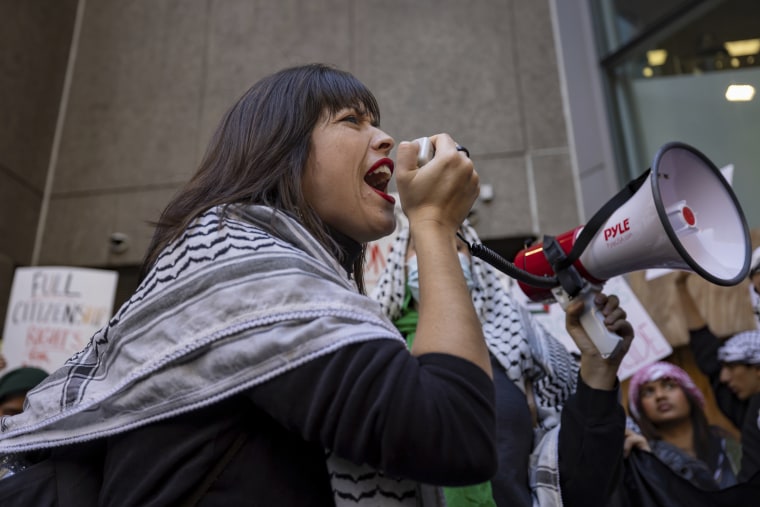
The efforts to curb SJP’s activities appear to have added to the firestorm. Columbia students protested over university administrators’ decision, which also put prohibitions on another group, Jewish Voice for Peace. The American Civil Liberties Union and the civil rights organization Palestine Legal filed a federal lawsuit on behalf of students at the University of Florida, alleging that the state’s “deactivation” order violated the U.S. Constitution.
In the lawsuit, the ACLU argues that Florida officials have not provided evidence or a basis for the “material support” for terrorism allegation. The civil liberties group states that the Supreme Court, in the 2010 decision Holder v. Humanitarian Law Project, found that “independent political advocacy” does not equal support of a terror group.
“Independent political advocacy is not a fungible ‘service’ akin to financial contributions,” the ACLU wrote in the suit. “It does not impart a skill that terrorist organizations may use to their benefit, and it does not directly displace costs so as to effectively subsidize a terrorist organization’s illegal efforts.”
Jonathan Friedman, a director at PEN America, a group that advocates for free expression, blasted the DeSantis order as “part of a pattern from the Florida government,” which he said is “ready to cast aside free speech to silence students and censor campuses.”
Friedman said he believes the “SJP toolkit in question included abhorrent sentiments, but when university administrators or government officials believe students have made offensive statements or even supported hateful ideologies, it does not give them free license to abridge First Amendment rights.”
Jeremy Redfern, a spokesman for DeSantis, did not immediately reply to two emails seeking comment on the lawsuit.
Guilt by association?
The ACLU argues that SJP members at the University of Florida are effectively being penalized because of the national steering committee’s rhetoric about Oct. 7 — a sentiment echoed by students in other states.
“We are not directly related to the national organization. We have our own missions and our own demands,” said Levitt, the ASU student. “We share the same name, but we don’t necessarily endorse everything the national SJP puts out.”
“I think grouping every individual chapter with what the national organization has said does a disservice,” Levitt added.
The first chapter of SJP was founded at the University of California, Berkeley, in the early 1990s, and associated groups have since spread across the country. SJP chapters are not uniform in their tactics, and some are more confrontational than others. The typical chapter holds protests, rallies and other campus events that are meant to raise awareness about the plight of the Palestinian people.
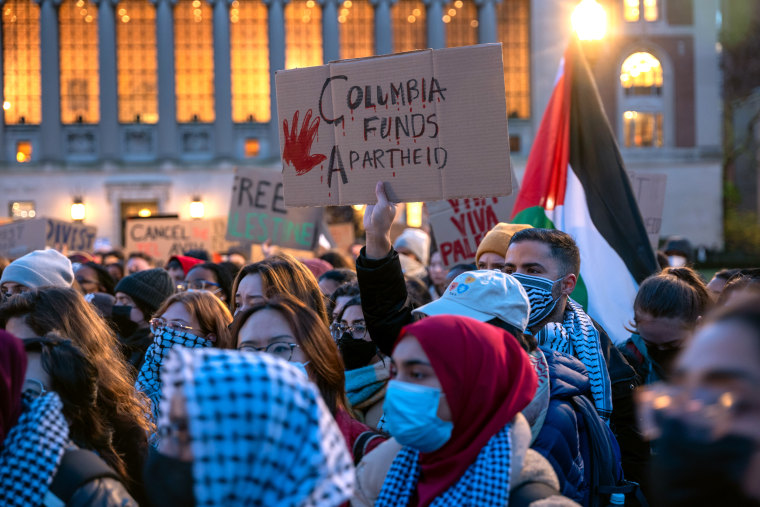
However, a member of SJP at the University Florida who spoke on the condition of anonymity because they were concerned about digital harassment said that many ground-level chapter members nonetheless agree with the national wing’s rhetoric and political goals. “I don’t think it’s accurate to say everyone involved in the SJP is denouncing” the national coalition’s language, the student said.
Indeed, the ADL has highlighted various “radical comments” from SJP chapters that echo the rhetoric used in the national “toolkit,” such as a statement from students at Hunter College that calls on institutions to “stand up against the occupation and actively support the Al-Aqsa Flood initiative,” the Arabic name for the Oct. 7 attack.
Gali Polichuk, 22, a senior studying sustainability at the University of Florida, said she is feeling increasingly “on edge” about rising antisemitism on campuses nationwide. She believes the local SJP has a right to protest the war, but she is “frustrated” that the group’s rhetoric has fostered what she characterized as a “hateful environment.”
She was particularly disturbed when she heard a group of pro-Palestinian activists chanting “resistance is justified,” which she interpreted as a reference to Oct. 7. “At the end of the day, it’s free speech,” Polichuk said.
Brandeis University’s decision to ban SJP is not unprecedented. Fordham University barred students from starting an SJP chapter in part because administrators believed the club would create “polarization” on campus and “run contrary to the mission and values” of the school, according to Palestine Legal.
The SJP restrictions at Columbia and George Washington University are more limited in scope: Columbia’s chapter is suspended for the rest of the fall term; GWU’s chapter is suspended for three months.
Of course, not every SJP chapter clashes with educational administrators. The relationship between SJP members and university leaders at the University of Oregon, for example, “has been fairly smooth, with no reported issues,” said Maxwell Gullickson, a student at the Eugene campus who is involved in the group, which held a rally on the campus this month that drew little pushback.
“It is noteworthy that, as of now, there haven’t been any indications from the university administration about attempts to shut down our chapter,” Gullickson said in an email. “In the event that such a situation arises, we are prepared to assess the circumstances and determine an appropriate course of action.”


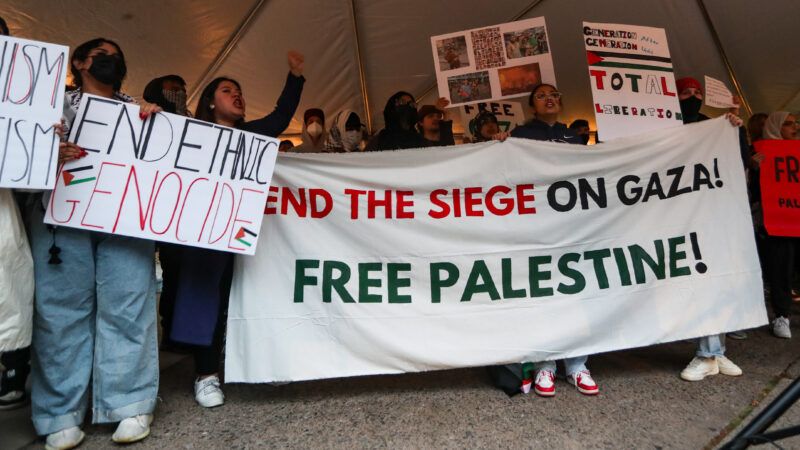





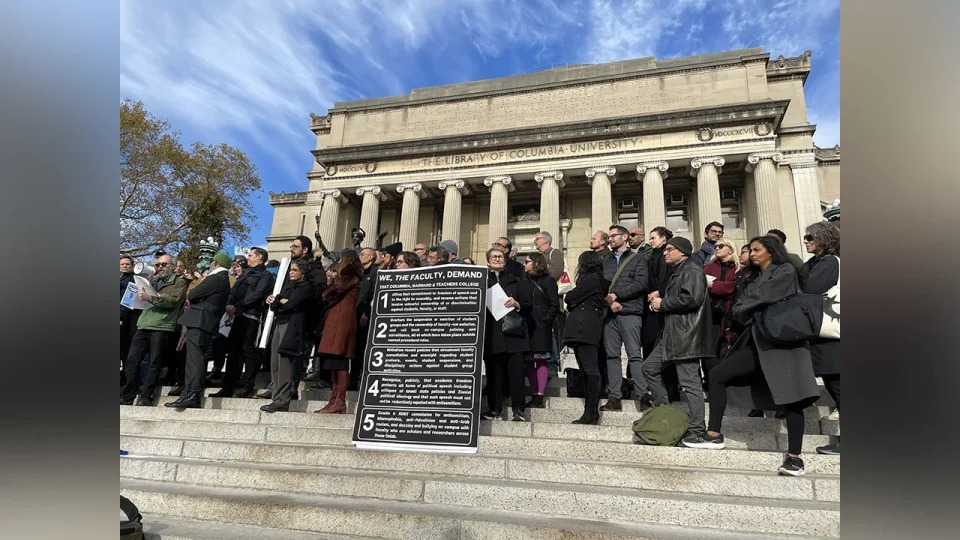


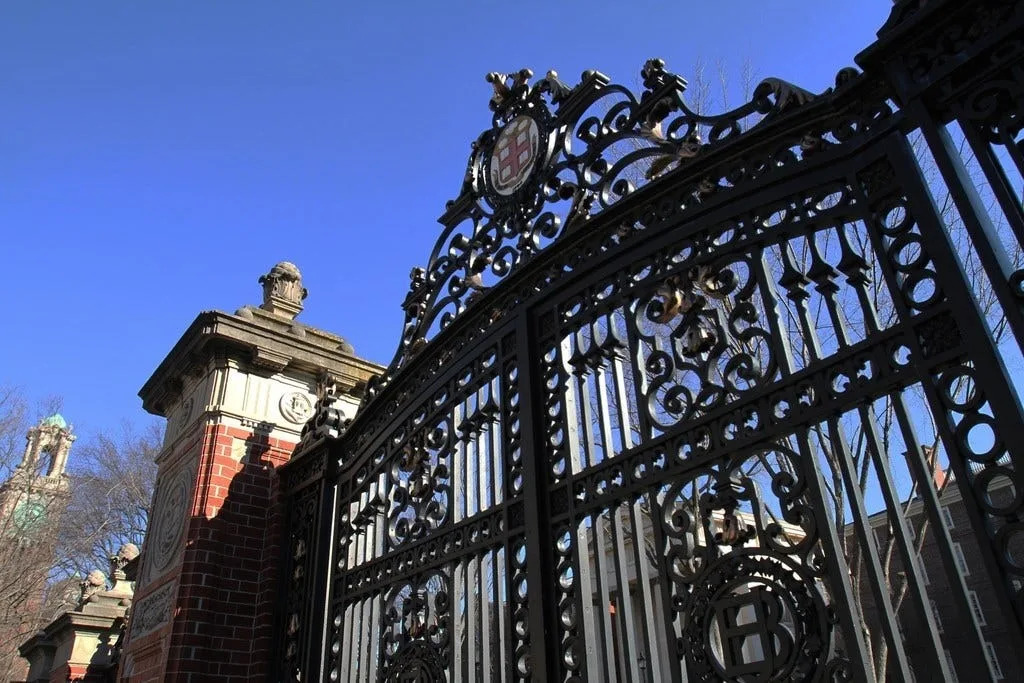 ]
]